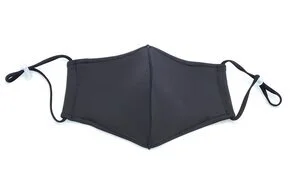“It’s terrifying. It’s indescribable.”
A British doctor recounts to reporters the experience of treating coronavirus patients without essential Personal Protective Equipment (PPE). There is simply a worldwide shortage of masks, gloves and surgical gowns. As such, doctors have been asked to sacrifice their own safety to treat patients diagnosed with COVID-19.
Hospitals worldwide have been overwhelmed by the surge in patients, and are struggling to contain outbreaks within their walls. It’s to the point that doctors are no longer being tested for coronavirus; they must work even if they’re sick.
A simple face mask takes on enormous value if it’s scarce. According to an Italian ICU doctor, “Every ventilator becomes like gold.” With such limited resources, hospitals are triaging who to save, and who to abandon.
A lynchpin in this situation is the availability of face coverings, surgical masks, and respirators (N95). N95 respirators are considered the highest standard of face protection, but are difficult to obtain due to export bans on the melt-blown material. Countries are stockpiling their own supply of N95 masks to meet local demands.
Traditional surgical masks, such as you might see in a surgical theater or at your dentist’s office, are not enough to protect against a respiratory disease like COVID-19. They only filter 45-55% of fine particles in the air. And, they are not air-tight against the user's face. Health officials state that regular face masks are not effective protection against coronavirus.
Due to shortages, the N95 masks that hospitals have in reserve are being used outside of suggested guidelines. Hospital staff report using their N95 mask three days in a row, when recommended use is only for one day. These masks are uncomfortable to wear at the best of times; their rigid fit and hard outer shell make it difficult for the wearer to breathe. An executive at Singapore's National Center for Infectious Diseases advises, “If you find the N95 mask easy to breathe in and comfortable, you are wearing it wrong.”
Doctors have resigned themselves to contracting coronavirus in their line of duty. Their bravery is commendable, but they should never have been put in mortal danger position in the first place.
Two new types of face masks offer to solve the logistical problems of obtaining enough N95 masks, as well as the problem of inadequate protection with traditional cloth face coverings and surgical masks. The masks have respective product features like being reusable, 98% collection efficiency of small particles, and is comfortable to wear for extended periods of time.
Zansors, a leader in breathing technology, has developed the Nano-Shield98TM and the Micro-ShieldTM face masks. Both masks use Cool FabricTM material to give comfort, breathability, UV protection, silver ion benefits, and cooling properties. Nano-Shied98TM shows 98% collection efficiency of airborne particulates based on laboratory testing in USA and South Korea. Micro-ShieldTM is better than the cotton/cloth face coverings based on a key scientific study: Comparison of Filtration Efficiency and Pressure Drop in Anti-Yellow Sand Masks, Quarantine Masks, Medical Masks, General Masks, and Handkerchiefs (http://aaqr.org/files/article/668/36_AAQR-13-06-OA-0201_991-1002.pdf)
Nano-Shield98TM and Micro-ShieldTM masks are a solution to mask shortages. Both Nano-Shield98TM and Micro-ShieldTM masks can be quickly cleaned by spraying them with an 70% isopropanol alcohol solution, then leaving them to air-dry for 10 minutes. Both Micro-Shield mask and the mask shell for Nano-Shield98TM can be cleaned using a washer.
Nano-Shield98TM and Micro-ShieldTM are made with polyester and spandex material that are similar to athletic gear made by top sports clothing companies and thus make Nano-Shield98TM and Micro-ShieldTM masks extremely comfortable to wear. Testers have likened the feel of these masks to silk. There are four sizes (XS, S, M, L) of mask available, and the mask straps have adjustable clasps to customize and tighten the fit to prevent air leakage. The Cool FabricTM material is easily breathable as well. A well-fitted, breathable mask would be a welcome change for healthcare professionals from the hard, stifling material of a N95 mask.
There’s another thing to consider when the coronavirus crisis finally passes: what will happen to single-use waste? Disposable face masks will find their final resting place in landfills.
Comfortable, effective, reusable masks are the necessary alternative to the current status quo. Healthcare workers cannot keep endangering themselves in order to care for the sick. They should be able to go about their work protected and comfortable. If we are to be in this crisis for months to come, then a solution is needed quickly.
Zansors is committed to empowering doctors, nurses, healthcare workers, patients, Warfighters and first responders with technology that solves yesterday’s problems. Zansors has carved out a niche in the breath technology space with small yet powerful wearable sensors that detect breathing patterns for sleep apnea patients, athletes and yogis. Our breath is something we take for granted every day, until a crisis like the novel coronavirus puts the importance of breathing into perspective.
The Nano-Shield98TM and Micro-ShieldTM face masks can help save the lives of doctors, nurses, patients, Warfighters, first responders, and civilians. Effective protection against airborne germs can help slow the spread of germs, halting the crisis sooner. Nano-Shield98TM and Micro-ShieldTM masks can allow healthcare workers to work safely and comfortably, which is the least they deserve. The reusable masks will also lessen the strain on the environment that will inevitably come with continued reliance on single-use masks.
We want people to breathe easier, and to breathe safer. Your breath has never been more important.

